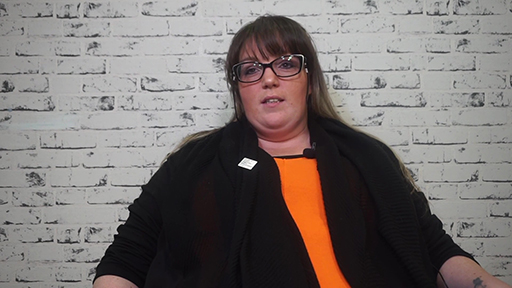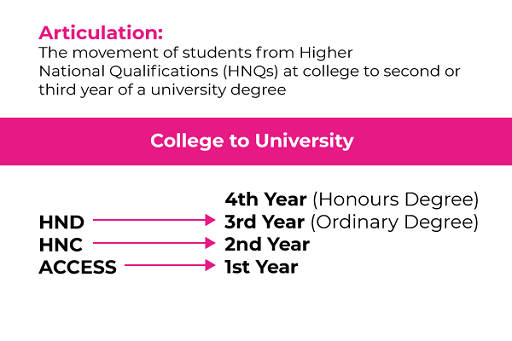Use 'Print preview' to check the number of pages and printer settings.
Print functionality varies between browsers.
Printable page generated Tuesday, 30 April 2024, 5:54 AM
4 Higher Education
Fair access for Care-Experienced people
The Commission for Widening Access (CoWA) set out a strategy to deliver the First Minister’s vision of equal access that, by 2030, a child born in Scotland’s most deprived communities has the same chance of going to university as a child born in a least deprived community, by the time they leave school.
“…those with care experience, who meet the access threshold, should be entitled to the offer of a place at a Scottish university. Entitlement should also apply to those with a care experience who have had to take a break from higher education and wish to return.”
Scottish universities have now developed clear and consistent indicators in their contextualised admissions policies. This means that an applicant’s grades are considered within the wider context in which they were obtained. This recognise that prior academic achievement isn’t the only predictor of future potential.
A contextualised offer takes into account a wider range of contextual factors than just exam results, such as SIMD20, SHEP schools and eligibility for free school meals, as well as care experience. This has also been called adjusted entry but Scottish universities have agreed to use the term minimum entry requirements for consistency and clarity (Universities Scotland, 2019). The minimum requirements for a course will reflect the best evidence on the level of achievement necessary for successful completion of the course.
Some institutions or courses may require a portfolio submission, audition or interview in addition to academic entry requirements. Contextual admissions indicators will apply to each part of the process to give Care-Experienced applicants the best chance of success.
Contextualised admissions
This is one of the most powerful tools universities use to promote fair access. If Care-Experienced applicants meet the minimum entry requirement for a course they will receive an offer.
Articulation
Articulation is a process that enables students with Higher National (HN) level college qualifications to gain advanced or direct entry to partner universities. Care-Experienced students are more likely to begin their higher education journey at college, so articulation can be an effective route to achieve a degree.
Mapped across the Scottish Credit and Qualifications Framework (SCQF), HN qualifications are considered to have parity to corresponding years of study at university. Full credit for the HN award may be available when the college and university have an articulation agreement in place which maps the curricula of each institution to a direct-entry route. This means an articulating student could complete a four year undergraduate degree in the same time as a student who started university in first year. However, not all universities have articulation routes in place.
Case study: Carol
My learner journey has been, well, disjointed, to say the least. Academically I struggled when I was younger, I didn’t take things in as quickly as others and carried the barriers that people associate with FAS (Fetal Alcohol Syndrome). However, I left High School with the grades needed to get into university.
I finished first year and decided I didn’t want to go back. I dropped out, leaving University with no additional qualifications and plenty of additional debt.
I gained employment in an insurance department which then led to me working in accounts for the next 13 years. Within that time, I had two children, who are now 8 and 6.
In 2015 I enrolled onto the HNC Social Care course, at Fife College as a mature student. Once I’d completed that I moved onto a two-year HND in Social Sciences.
At that point I was 6 months pregnant with my third son but with the support of Fife College I embarked on the two-year journey.
The second year of my HND was my most enjoyable year where I got involved with Fife College Students’ Association as a Care Experienced Officer. I was able to use my own personal experiences to help remove barriers for other students in the same situation.
During this year I was also introduced to the OU, through my criminology tutor, who works in Fife College as well as the Open Uni. Until this point, I had completely ruled out the idea of achieving a degree. I couldn’t go back to university; it didn’t work in the past and I now had too many other commitments.
But the OU meant that maybe I could finally achieve this goal. I then transferred my credits from my HND to the OU through the articulation route that Fife College has with them and began my one-year (120 credit) course in October 2018.
I’d picked social sciences because when I’d told a lady I knew, who had dealt with my adoption file when I was younger, “I’d love to do a job like you”, she said “do social sciences, it’s a great course to have.” You learn about society and the relationships people build with each other, and the factors that affect that.
The journey this year has been challenging to say the least between work, kids and studying but it’s very rewarding.
Care-Experienced Student Bursary
In recognition of the additional challenges and historically poor outcomes of Care-Experienced people, the Care Experienced Student Bursary was introduced by the Scottish Government in 2017 for full-time students up to the age of 26 years old at the start of their course. The bursary is an annual, non-repayable award (currently £8,100) for students at college and university.
From the 2020–21 academic year, the Care-Experienced Student Bursary will be paid to all students with care experience, regardless of age. Students on higher education courses apply to the Student Awards Agency Scotland (SAAS) for this funding.
Care-Experienced students who are under 26 and studying full-time will continue to be eligible to receive additional funding such as the SAAS Care-Experienced Accommodation Grant. There may also be financial support available from the student’s local authority.
While part-time students are not eligible for the bursary and accommodation grant, many universities have discretionary funds that can help with expenses such as laptops and childcare.
Activity 7
Find out what funding is available to Care-Experienced students in your university. Other than the bursary, are the supports available to both full- and part-time students?
Make some notes in your learning journal or in the box below.
Self-declaration
Declaring care experience can benefit students as universities may provide contextualised entry, year-round accommodation or other supports, and they may be eligible for financial support such as bursaries. But students may be reluctant to declare because they aren't aware of the benefits or may fear that they will face stigma if people know.
For most universities, one of the main ways we know if someone is Care-Experienced is if they tick the box on their UCAS form when they apply. The box to self-declare care experience does not appear on the form until an applicant has filled in some of their details.
In the video below, Lee talks about her reasons for not declaring her care experience.

Transcript
I didn’t know. I knew I was in care, but I didn’t know that care experienced was a thing, like where it helped me in any way. I didn’t know that it entitled me to any sort of help, because if I had known about it when I was younger, it certainly would have been something I would have engaged in, because it was something I needed when I was younger. But declaring it didn’t occur to me either because I didn’t realise that care experienced was something that would make a difference, so I didn’t declare that I was care experienced because I didn’t know, it was just another part of my life. And discrimination was something that I had anyway, so it didn’t matter that I was in care, I had it anyway.
Activity 8
Take a moment to think of something personal to you that not many people know.
Consider the reasons you choose to keep it private. How you would feel if somebody knew this about you before you had even met them?
Discussion
Many Care-Experienced people find it difficult to disclose that they have been in care. This might be due to prior experiences of discrimination and bullying. They may worry that the information they give will prejudice their application. Ticking the ‘care leavers’ box on the UCAS application can feel stigmatising.
Students have the right to choose whether or not they declare their care experience, and how they choose to do it. If a student you are supporting discloses to you they are Care-Experienced, you may be the first person at university they have told. It could mean they would benefit from some further support. Consider if their situation is impacting on their studies. Be sensitive with the information they have given you. Ask if it’s ok to record this anywhere or pass this information on.
Take a moment to think of what first steps you would take should a student disclose this information to you. Who would be your key points of contact to ensure the student receives the support they require, and that the information disclosed is properly recorded?
Watch Gary talk about what happened when he ‘ticked the box’ to declare his care experience.

Transcript
I think when I initially went to university there was a box on the application form that said ‘care experienced’ but I didn’t even understand the definition of care experienced at that time. I actually, funnily enough, ticked the box because I’d been to rehab. I thought that my rehab would have been classed as residential care. So, I ticked the box for residential care, and I sort of ticked the box for the wrong reason, and then it turns out that I actually could have just ticked the box if it just said ‘care experienced’.
my whole time throughout university, I’d already defined myself as care experienced, and you would think that ticking that box there would be some protocol in place that the university would be giving me a lot more support than what they actually did. Fair do’s, they financially gave me £1000, but apart from that they never actually gave me physical support, they never gave me advice. And that is a flaw that I feel I could have benefitted from if there was that support in place. Especially initially when you go in; I was very uncomfortable. I look at it now, I’ve got counsellors and stuff now, but even having that right counsellor or even one point of call in the university when you go in, someone that you can speak to, I think that would be very important, it would be a very important factor and would have helped me in the long run.
Beyond graduation – into employment and other positive destinations
Scottish Government data shows that having a background in care is likely to lead to poorer employment outcomes.
Nine months after leaving school, 21% of looked after young people who were in care for the full year are classed as unemployed, compared to 6% of their peers. For those in care for part of the year, the unemployment figure is 29% (Scottish Government, 2019).
After graduation Care-Experienced students can also struggle to find employment.
In this audio, George Dodds from the NHS explains why he feels it is important for the NHS to offer roles to Care-Experienced people.
Transcript
So, for me, Cameron, the way I describe this to people when they ask me is if I had a son or a daughter who couldn’t get a job or had less chance of a good job than a lot of their school-age peers and I had a family business – could be a butcher’s, could be a baker’s, could be an IT business – you’d give them a job, wouldn’t you? You’d give your son or daughter a job in that business. So, if I see the NHS as a family business that I work in now, and I’m lucky enough to have some responsibility and influence, well, why wouldn’t I give care-experienced young people a job?
Care-Experienced students may lack family support and have no role models they can ask about careers. Careers services at university can support them to develop interviewing skills, fill in job applications and build networks. This support can begin from first year and continue until beyond graduation. Many universities offer careers support for alumni.
Postgraduate study
Care-Experienced students may choose to go on to postgraduate study. In the videos below Gary and Lynda about their motivations and the challenges involved.

Transcript
My plans for the future are, looking forward, I’m going to do my Honours year this year, one more essay to go. Get my Honours year done, and then I’m looking to go on to a Masters in Social Work. I never wanted to be a social worker, but now I see the value in a social work degree. I want to get myself educated to a level that I can become one of them to be more like us, because it’s always that “them and us” barrier, so I’m trying to break that down.

Transcript
And, to be honest, I’m now at a stage where I’ve got all these awards, I’m doing really well for myself, but I want to go on and do a Masters. I was always under the impression that because when I progressed from HNC to undergraduate that I would get… basically, I was under the impression that if you progress with SAAS or you progress in your course, you would always be funded. But when I came to graduating now, I’ve been looking to do a Masters, and I’ve found out that’s not the case. I’m at a stage now where I’m £39,000 in debt, and a Masters course costs £20,000, and I’m in a very difficult position because I can’t actually get funding for the Masters courses because SAAS only fund up to £5500 loan for the course fees and stuff. I just wish myself that… I thought if I go to university and work as hard as I possibly can and get all these awards that I would just naturally be able to progress but I’m finding out that that isn’t the case.
Activity 9
What support does your institution offer its Care-Experienced graduates? Check your website or talk to your Careers and Employment team. Make some notes about career advice and guidance, internships or recruitment policies.
Feedback
Universities are employers themselves. As Corporate Parents, we can look at what more we could be doing to employ care-experienced people. You may be interested in accessing training on this through Who Cares? Scotland.
Reflection
Every university has a named contact for Care-Experienced students who can advise on what support is available for them. If you don’t know who this is in your university, spend a few moments to find out. Their details and information about support can be found:
- On your university’s website
- On the Propel website – a dedicated resource for Care-Experienced young people in the UK to access the information and support they need to plan for further and higher education.
- On Student Information Scotland – a new website for Scottish students on all aspects of finance for their studies
Activity 10
Thinking back to some of the learner journeys in this section, what support does your university provide for Care-Experienced students that could improve their chances of completing their studies?
Some of the supports identified in this Session include:
- Articulation pathways
- Financial support
- A named contact for care-experienced students
- Career advice and mentoring
What else can you think of? Have a look at the websites above and make notes in your learning journal or in the box below.
Now continue to Session 5 Corporate Parenting and you.
